Here are my favorite poems about purgatory categorized:
- Short poems about purgatory
- Famous poems about purgatory
- Poems about suffering and purgatory
So if you want the best poems about purgatory, then you’re in the right place.
Keep reading!
- 93 Triumphant Poems About Resurrection
- 23 Empowering Poems About Redemption
- 125 Magical Christmas Poems

Soul-Searching Poems About Purgatory
Enter upon a profound journey through a meticulously curated anthology of poems delving into the depths of purgatory.
Immerse yourself in a collection that encompasses concise and evocative verses, as well as renowned works dedicated to this haunting theme.
Uncover the pinnacle of poetic expressions on purgatory, all expertly gathered in a single destination.
Prepare to be enthralled as you discover the most exceptional poems capturing the essence of this enigmatic realm.
Let’s get started!
My #1 Favorite Poem About Purgatory
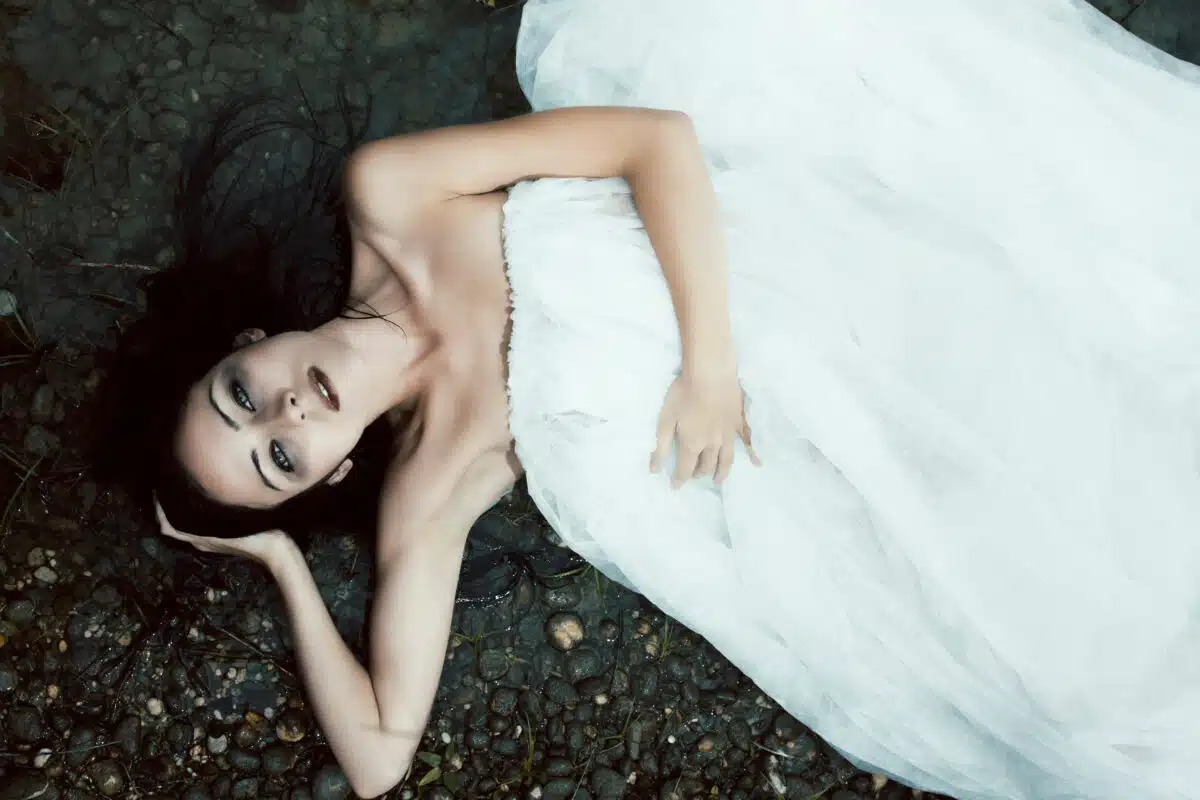
“The Abyss” by L. Florence Wynne Ffoulkes
Alone! with darkness, the abysmal Space,
Conscious of nought, save of one fact, I live;
No outer strength, no power to take or give,
No gage of time, no guarantee of place
Whereon my feet may rest, no Holy Shrine
To waken sense of reverence or fear,
No twin vibration to wring forth the tear
Ofhuman sympathy. From this deep mine
Of desolation, no return. All still,
All void, all fathomless, all utter dark,
In the vast Universe, no shelt’ring Ark;
No power to raise the might of human will;
Backward I gaze, nor catch the Living Breath,
Forward, and still I face the deathless death.
Short Poems About Purgatory
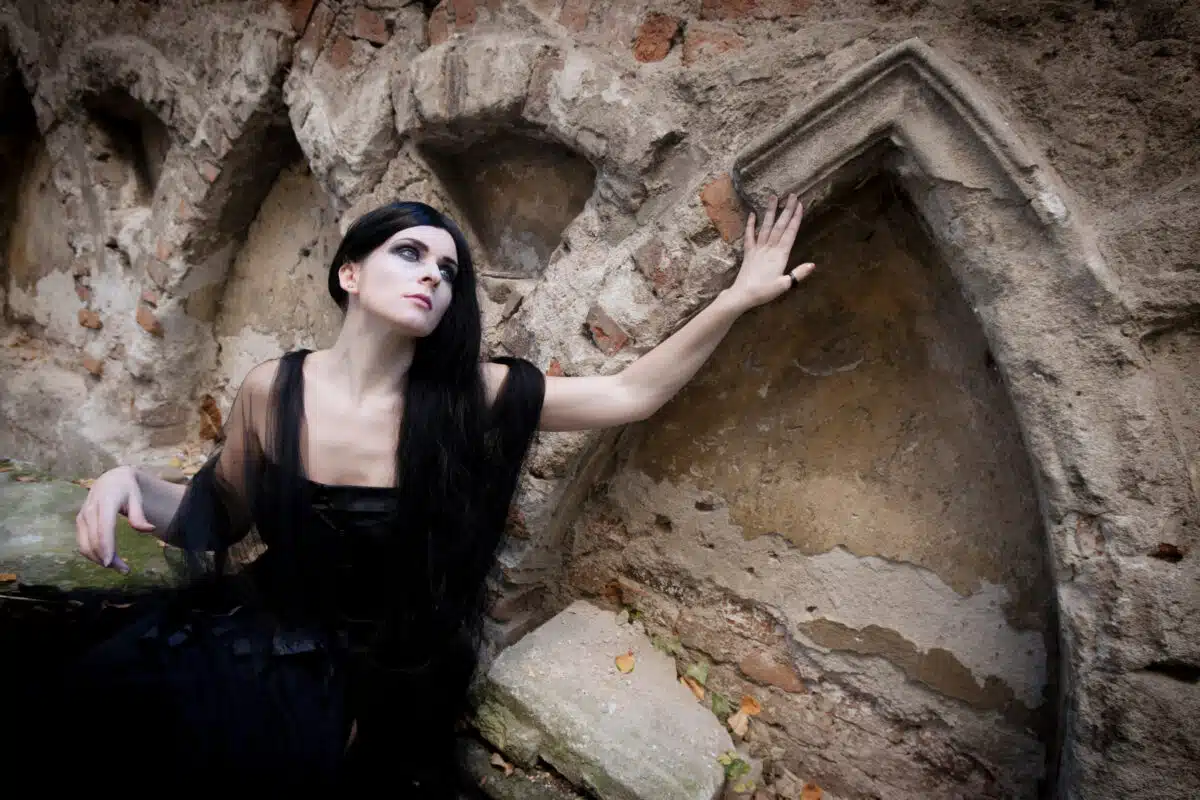
“Purgatory” by Robert Herrick
Readers, we entreat ye pray
For the soul of Lucia;
That in little time she be
From her purgatory free:
In the interim she desires
That your tears may cool her fires.
“Sonnets XIII.” by John Milton
To Mr. H. Lawes on the publishing his Airs.
Harry, whose tuneful and well measur’d song
First taught our English musick how to span
Words with just note and accent, not to scan
With Midas ears, committing short and long ;
‘Thy worth and skill exempts thee from the throng,
With praise enough for Envy to look wan ;
To after age thou shalt be writ the man,
That with smooth air could’st humour best our tongue.
Thou honour’st verse, and verse must lend her wing
To honour thee, the priest of Phoebus’ quire,
That tun’st their happiest lines in hymn, or story.
Dante shall give Fame leave to set thee higher
Than his Casella, whom he woo’d to sing
Met in the milder shades of Purgatory.
“The Soul” by Robert Herrick
When once the soul has lost her way,
O then how restless does she stray!
And having not her God for light,
How does she err in endless night!
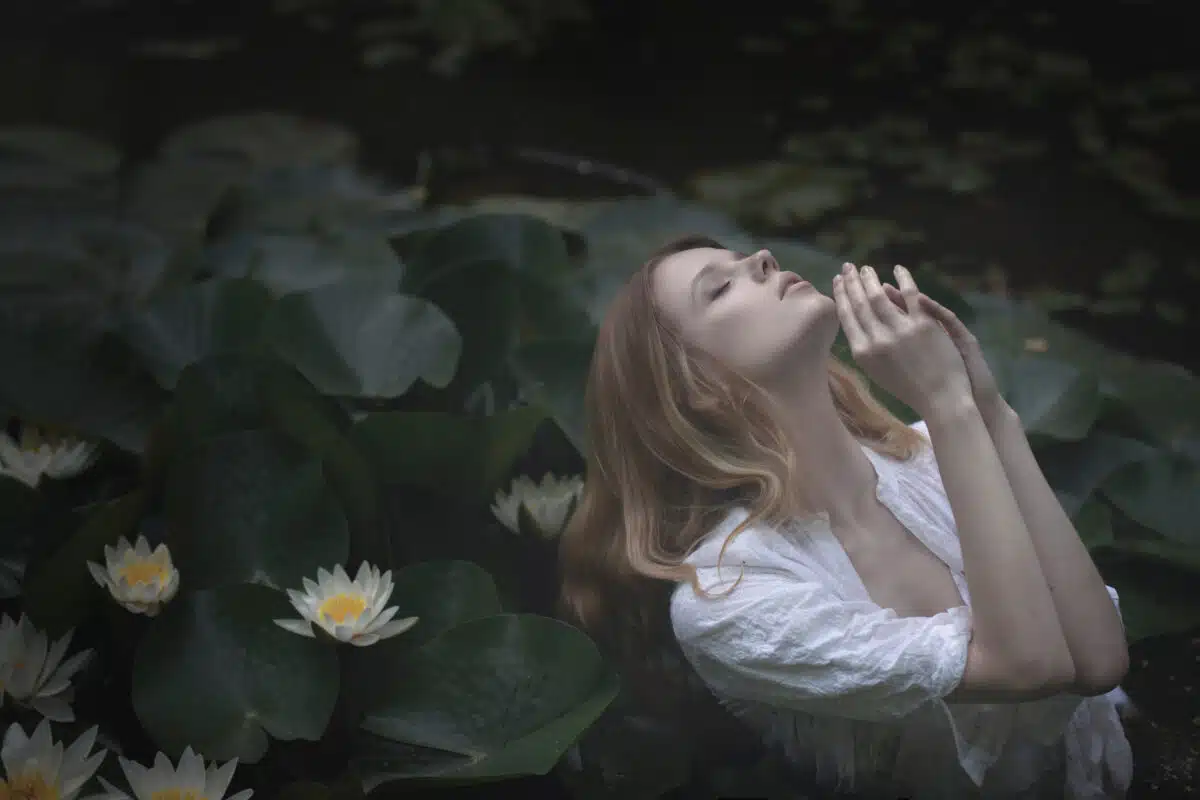
“Lo! Purgatory!” by Mrs. J. Sadlier
Lo! Purgatory! Doctrine blest,
Engarlanded with legends wild,
Historic lore and poetry’s fair flowers!
“Lord, shall we grumble when thy flames do scourge us?” by Francis Quarles
Lord, shall we grumble when thy flames do scourge us?
Our sins breathe fire; thy fire returns to purge us.
Lord, what an alchemist art thou, whose skill
Transmutes to perfect good from perfect ill!
“Compensation” by Caroline Atherton Mason
Not in each shell the diver brings to air
Is found the priceless pearl, but only where
Mangled, and torn, and bruised wellnigh to death,
The wounded oyster draws its laboring breath.
O tired and suffering soul! gauge here your gain;
The pearl of patience is the fruit of pain.

“The Eternal Spirit” by L. Florence Wynne Ffoulkes
Eternal Energy, Immortal Fire,
Moved o’er the face of th’ Immaculate Deep;
And stirred within the void Promial Sleep,
The kindred echo of a twin desire;
Forthwith, the inextinguishable Spark,
The Master Essence of the All-Divine,
Issued, transcendent, from the Holy Shrine,
To penetrate the realm of utter dark!
Subsistent SPIRIT breathed in the Abyss,
Potential Being met Its Ultimate;
The All- pervading GOD Primordiate,
Embraced Its own, in One transcendent Kiss!
Responsive to the flow of Fiery Breath,
The Floods awoke to Life, through Cosmic death.
“Sonnet IX” by George Santayana
Have patience; it is fit that in this wise
The spirit purge away its proper dross.
No endless fever doth thy watches toss,
For by excess of evil, evil dies.
Soon shall the faint world melt before thine eyes,
And, all life’s losses cancelled by life’s loss,
Thou shalt lay down all burdens on thy cross,
And be that day with God in Paradise.
Have patience; for a long eternity
No summons woke thee from thy happy sleep;
For love of God one vigil thou canst keep
And add thy drop of sorrow to the sea.
Having known grief, all will be well with thee,
Ay, and thy second slumber will be deep.
“Sonnet VIII” by George Santayana
O martyred Spirit of this helpless Whole,
Who dost by pain for tyranny atone,
And in the star, the atom, and the stone,
Purgest the primal guilt, and in the soul;
Rich but in grief, thou dost thy wealth unroll,
And givest of thy substance to thine own,
Mingling the love, the laughter, and the groan
In the large hollow of the heaven’s bowl.
Fill full my cup; the dregs and honeyed brim
I take from thy just hand, more worthy love
For sweetening not the draught for me or him.
What in myself I am, that let me prove;
Relent not for my feeble prayer, nor dim
The burning of thine altar for my hymn.
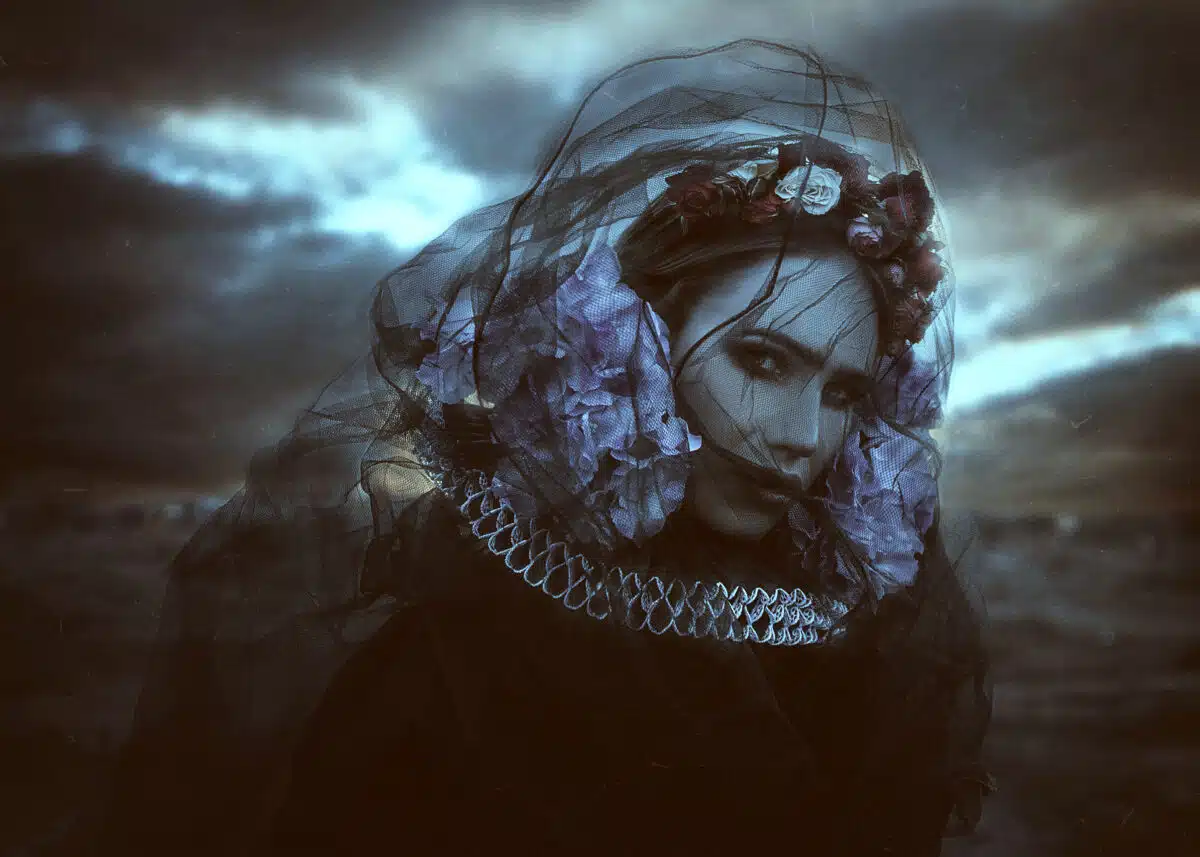
“Gli occhi miei vaghi delle cose belle” by Michael Angelo (George Santayana, Translator)
Ravished by all that to the eyes is fair,
Yet hungry for the joys that truly bless,
My soul can find no stair
To mount to heaven, save earth’s loveliness.
For from the stars above
Descends a glorious light
That lifts our longing to their highest height
And bears the name of love.
Nor is there aught can move
A gentle heart, or purge or make it wise,
But beauty and the starlight of her eyes.
“A Minuet: On Reaching the Age of Fifty” by George Santayana
II
Dame Nature, with unwitting hand,
Has sparsely strewn the black abyss with lights
Minute, remote, and numberless. We stand
Measuring far depths and heights,
Arched over by a laughing heaven,
Intangible and never to be scaled.
If we confess our sins, they are forgiven.
We triumph, if we know we failed.
Famous Poems About Purgatory
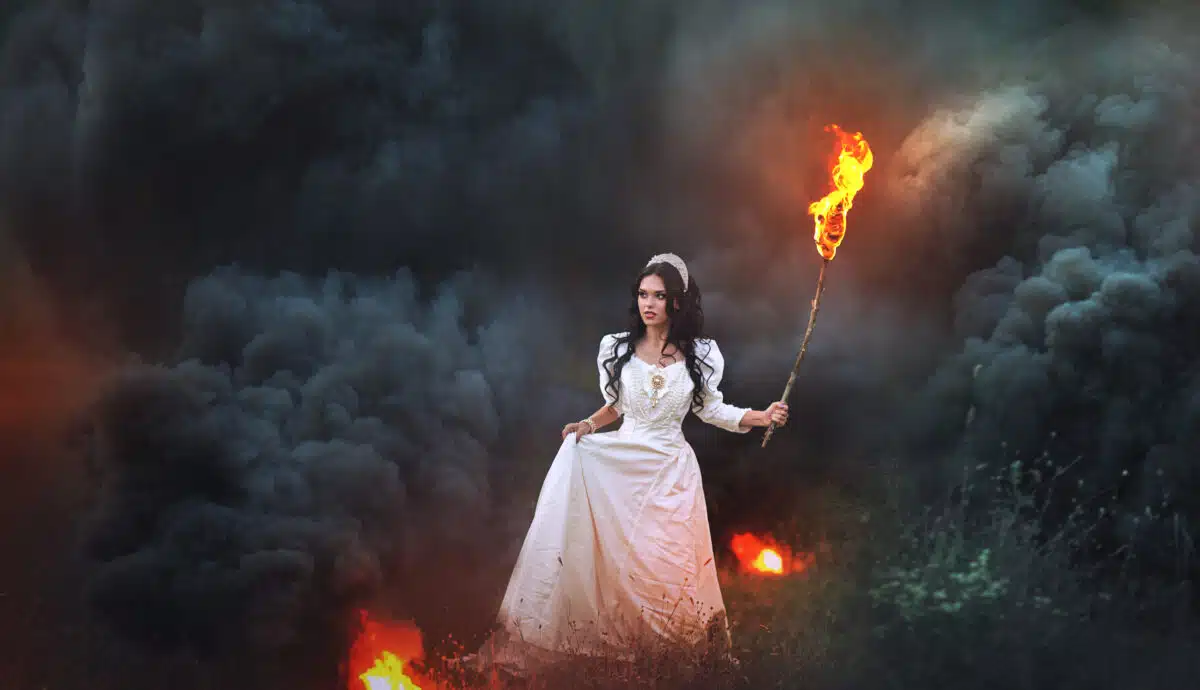
“The Divine Comedy: Canto I” by Dante Alighieri
O’er better waves to speed her rapid course
The light bark of my genius lifts the sail,
Well pleased to leave so cruel sea behind;
And of that second region will I sing,
In which the human spirit from sinful blot
Is purged, and for ascent to Heaven prepares.
Here, O ye hallow’d Nine! for in your train
I follow, here the deaden’d strain revive;
Nor let Calliope refuse to sound
A somewhat higher song, of that loud tone
Which when the wretched birds of chattering note¹
Had heard, they of forgiveness lost all hope.
Sweet hue of eastern sapphire, that was spread
O’er the serene aspect of the pure air,
High up as the first circle, to mine eyes
Unwonted joy renew’d, soon as I ‘ scaped
Forth from the atmosphere of deadly gloom,
That had mine eyes and bosom fill’d with grief.
The radiant planet, that to love invites,
Made all the orient laugh, and veil’d beneath
The Pisces’ light, that in his escort came.
To the right hand I turn’d, and fix’d my mind
On the other pole attentive, where I saw
Four stars ne’er seen before save by the ken
Of our first parents. Heaven of their rays
Seem’d joyous. O thou northern site! bereft
Indeed, and widow’d, since of these deprived.
As from this view I had desisted, straight
Turning a little toward the other pole,
There from whence now the wain’ had disappear’d,
I saw an old man standing by my side
Alone, so worthy of reverence in his look,
That ne’er from son to father more was owed.
Low down his beard, and mix’d with hoary white,
Descended, like his locks, which, parting, fell
Upon his breast in double fold. The beams
Of those four luminaries on his face
So brightly shone, and with such radiance clear
Deck’d it, that I beheld him as the sun.
“Say who are ye, that stemming the blind stream,
Forth from the eternal prison-house have fled?”
He spoke and moved those venerable plumes.
“Who hath conducted, or with lantern sure
Lights you emerging from the depth of night,
That makes the infernal valley ever black?
Are the firm statutes of the dread abyss
Broken, or in high Heaven new laws ordain’d,
That thus, condemn’d, ye to my caves approach?”
My guide, then laying hold on me, by words
And intimations given with hand and head,
Made my bent knees and eye submissive pay
Due reverence; then thus to him replied :
“Not of myself I come; a Dame from heaven
Descending, him besought me in my charge
To bring. But since thy will implies, that more
Our true condition I unfold at large,
Mine is not to deny thee thy request.
This mortal ne’er hath seen the farthest gloom;
But erring by his folly had approach’d
So near, that little space was left to turn.
Then, as before I told, I was despatch’d
To work his rescue; and no way remain’d
Save this which I have ta’en. I have display’d
Before him all the regions of the bad;
And purpose now those spirits to display,
That under thy command are purged from sin.
How I have brought him would be long to say.
From high descends the virtue, by whose aid
I to thy sight and hearing him have led.
Now may our coming please thee. In the search
Of liberty he journeys: that how dear,
They know who for her sake have life refused.
Thou knowest, to whom death for her was sweet
In Utica, where thou didst leave those weeds,
That in the last great day will shine so bright.
For us the eternal edicts are unmoved;
He breathes, and I of Minos am not bound,
Abiding in that circle, where the eyes
Of thy chaste Marcia beam, who still in look
Prays thee, O hallow’d spirit ! to own her thine.
Then by her love we implore thee, let us pass
Through thy seven regions; for which, best thanks
I for thy favour will to her return,
If mention there below thou not disdain.”
“Marcia so pleasing in my sight was found,”
He then to him rejoin’d, “while I was there,
That all she ask’d me I was fain to grant.
Now that beyond the accursed stream she dwells,
She may no longer move me, by that law,”
Which was ordain’d me, when I issued thence.
Not so, if Dame from Heaven, as thou sayst,
Moves and directs thee; then no flattery needs.
Enough for me that in her name thou ask.
Go therefore now: and with a slender reed
See that thou duly gird him, and his face
Lave, till all sordid stain thou wipe from thence.
For not with eye, by any cloud obscured,
Would it be seemly before him to come,
Who stands the foremost minister in Heaven.
This islet all around, there far beneath,
Where the wave beats it, on the oozy bed
Produces store of reeds. No other plant,
Cover’d with leaves, or harden’d in its stalk,
There lives, not bending to the water’s sway.
After, this way return not; but the sun
Will show you, that now rises, where to take
The mountain in its easiest ascent.”
He disappear’d; and I myself upraised
Speechless, and to my guide retiring close,
Toward him turn’d mine eyes. He thus began:
“My son! observant thou my steps pursue.
We must retreat to rereward; for that way
The champain to its low extreme declines.”
The dawn had chased the matin hour of prime,
Which fled before it, so that from afar
I spied the trembling of the ocean stream.
We traversed the deserted plain, as one
Who, wander’d from his track, thinks every step
Trodden in vain till he regain the path.
When we had come, where yet the tender dew
Strove with the sun, and in a place where fresh
The wind breathed o’er it, while it slowly dried;
Both hands extended on the watery grass
My master placed, in graceful act and kind.
Whence I of his intent before apprised,
Stretch’d out to him my cheeks suffused with tears.
There to my visage he anew restored
That hue which the dun shades of Hell conceal’d.
Then on the solitary shore arrived,
That never sailing on its waters saw
Man that could after measure back his course,
He girt me in such manner as had pleased
Him who instructed; and, oh strange to tell!
As he selected every humble plant,
Wherever one was pluck’d another there
Resembling, straightway in its place arose.
From “To — — Ulalume: a Ballad” by Edgar Allan Poe
Said we then—the two, then—”Ah, can it
Have been that the woodlandish ghouls—
The pitiful, the merciful ghouls—
To bar up our path and to ban it
From the secret that lies in these wolds—
Had drawn up the spectre of a planet
From the limbo of lunary souls—
This sinfully scintillant planet
From the Hell of the planetary souls?”
From “The Sycamores” by John Greenleaf Whittier
Songs of love and wailing lyke-wake
And the merry fair’s carouse;
Of the wild Red Fox of Erin
And the Woman of Three Cows,
By the blazing hearths of winter
Pleasant seemed his simple tales,
Midst the grimmer Yorkshire legends
And the mountain myths of Wales.
How the souls in Purgatory
Scrambled up from fate forlorn
On St. Keven’s sackcloth ladder
Slyly hitched to Satan’s horn.
Of the fiddler who at Tara
Played all night to ghosts of kings;
Of the brown dwarfs, and the fairies
Dancing in their moorland rings!
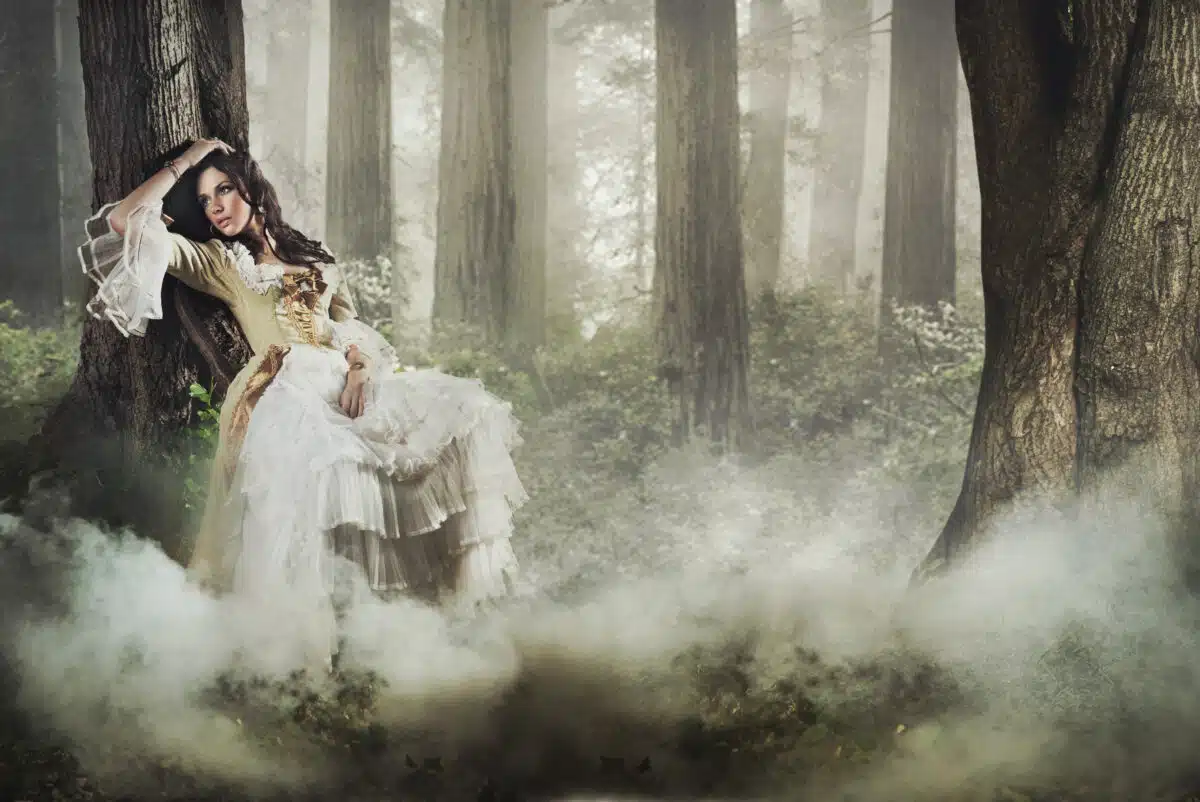
“Limbo” by Samuel Taylor Coleridge
The sole true Something—This! In Limbo’s Den
It frightens Ghosts, as here Ghosts frighten men.
Thence cross’d unseiz’d -and shall some fated hour
Be pulveris’d by Demogorgon’s power,
And given as poison to annihilate souls
Even now it shrinks them-they shrink in as Moles
(Nature’s mute monks, live mandrakes of the ground)
Creep back from Light-then listen for its sound;—
See but to dread, and dread they know not why
The natural alien of their negative eye.
“Tis a strange place, this Limbo !-not a Place,
Yet name it so ; -where Time and weary Space
Fettered from flight, with night-mare sense of fleeing,
Strive for their last crepuscular half-being; —
Lank Space, and scytheless Time with branny hands
Barren and soundless as the measuring sands,
Not mark’d by flit of Shades, -unmeaning they
As moonlight on the dial of the day!
But that is lovely-looks like Human Time, —
An Old Man with a steady look sublime,
That stops his earthly task to watch the skies ;
But he is blind-a Statue hath such eyes; —
Yet having moonward turn’d his face by chance,
Gazes the orb with moon- like countenance,
With scant white hairs, with foretop bald and high,
He gazes still, -his eyeless face all eye; —
As ‘ twere an organ full of silent sight,
His whole face seemeth to rejoice in light!
Lip touching lip, all moveless, bust and limbo
He seems to gaze at that which seems to gaze on him!
No such sweet sights doth Limbo den immure,
Wall’d round, and made a spirit-jail secure,
By the mere horror of blank Naught-at- all,
Whose circumambience doth these ghosts enthral.
A lurid thought is growthless, dull Privation,
Yet that is but a Purgatory curse;
Hell knows a fear far worse,
A fear-a future state;—’tis positive Negation!
“Elegie VI” by John Donne
Oh, let mee not serve so, as those men serve
Whom honours smoakes at once fatten and sterve;
Poorely enrich’t with great mens words or lookes;
Nor so write my name in thy loving bookes
As those Idolatrous flatterers, which still
Their Princes stiles, with many Realmes fulfill
Whence they no tribute have, and where no sway.
Such services I offer as shall pay
Themselves, I hate dead names: Oh then let mee
Favorite in Ordinary, or no favorite bee.
When my Soule was in her owne body sheath’d,
Nor yet by oathes betroth’d, nor kisses breath’d
Into my Purgatory, faithlesse thee,
Thy heart seem’d waxe, and steele thy constancie:
So, carelesse flowers strow’d on the waters face,
The curled whirlepooles suck, smack, and embrace,
Yet drowne them; so, the tapers beamie eye
Amorously twinkling, beckens the giddie flie,
Yet burnes his wings; and such the devill is,
Scarce visiting them, who are intirely his.
When I behold a streame, which, from the spring,
Doth with doubtfull melodious murmuring,
Or in a speechlesse slumber, calmely ride
Her wedded channels bosome, and then chide
And bend her browes, and swell if any bough
Do but stoop downe, or kisse her upmost brow;
Yet, if her often gnawing kisses winne
The traiterous banke to gape, and let her in,
She rusheth violently, and doth divorce
Her from her native, and her long-kept course,
And rores, and braves it, and in gallant scorne,
In flattering eddies promising retorne,
She flouts the channell, who thenceforth is drie;
Then say I; that is shee, and this am I.
Yet let not thy deepe bitternesse beget
Carelesse despaire in mee, for that will whet
My minde to scorne; and Oh, love dull’d with paine
Was ne’r so wise, nor well arm’d as disdaine.
Then with new eyes I shall survay thee,’and spie
Death in thy cheekes, and darknesse in thine eye.
Though hope bred faith and love; thus taught, I shall
As nations do from Rome, from thy love fall.
My hate shall outgrow thine, and utterly
I will renounce thy dalliance: and when I
Am the Recusant, in that resolute state,
What hurts it mee to be’excommunicate?
From “The Scourge of Heaven” by Victor Hugo
I.
Hast seen it pass, that cloud of darkest rim?
Now red and glorious, and now gray and dim,
Now sad as summer, barren in its heat?
One seems to see at once rush through the night
The smoke and turmoil from a burning site
Of some great town in fiery grasp complete.
Whence comes it? From the sea, the hills, the sky?
Is it the flaming chariot from on high
Which demons to some planet seem to bring?
Oh, horror! from its wondrous centre, lo!
A furious stream of lightning seems to flow
Like a long snake uncoiling its fell ring.
II.
The sea! naught but the sea! waves on all sides!
Vainly the sea-bird would outstrip these tides!
Naught but an endless ebb and flow!
Wave upon wave advancing, then controlled
Beneath the depths a stream the eyes behold
Rolling in the involved abyss below!
Whilst here and there great fishes in the spray
Their silvery fins beneath the sun display,
Or their blue tails lash up from out the surge,
Like to a flock the sea its fleece doth fling;
The horizon’s edge bound by a brazen ring;
Waters and sky in mutual azure merge.
“Am I to dry these seas?” exclaimed the cloud.
“No!” It went onward ‘neath the breath of God.
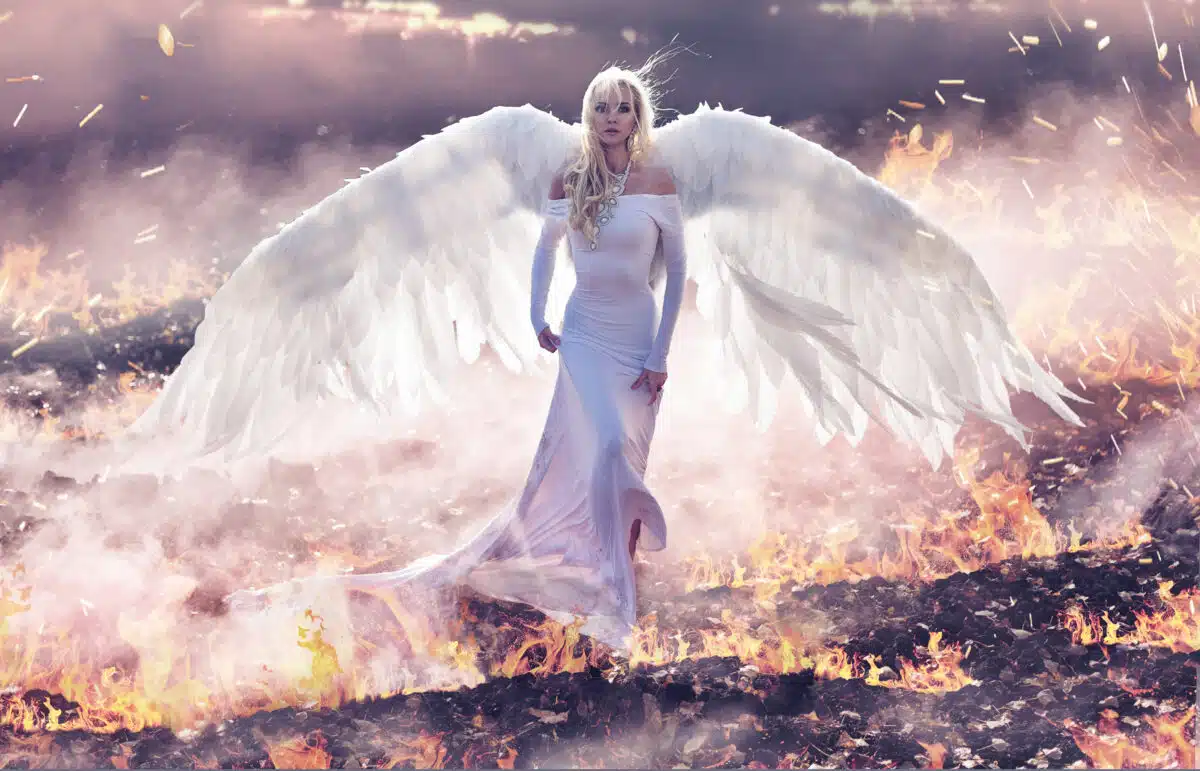
“God’s Furnace” by Charles Dent Bell
My God a Furnace hath of fire,
Its chambers all with flame aglow,
’Tis fann’d in love, and not in ire,
And on the coals He oft doth blow;
A Furnace kindled with His breath,
Cruel, and keen, and sharp as death.
Why doth He thus His fires prepare,
And fan them till they fiercely burn,
To scathe us with their angry glare,
Whichever way we move or turn?
That He may plunge His people in,
And cleanse them throughly from their sin.
He treats us as the goldsmith treats
The ruddy gold he prizeth well,
Who makes it pass thro’ savage heats,
And melts it in his crucible;
And this he does because he knows
’Tis destined for a monarch’s brows.
God’s fires burn up the seeds of ill
Which lurk within the secret heart;
God’s fires melt down the hardest will,
And sever dross and gold apart;
Thro’ all the spirit’s depths they run,
Until their cleansing work is done.
Oft at white heat the furnace stands,
Ready the evil to consume,
To shrivel up sin’s strongest bands,
With fires as fierce as those of doom;
For some He heats it seven times more
Than He has heated it before.
But in the furnace fires so keen,
God doth not leave us all alone,
And tho’ His presence is not seen,
There walks beside us His dear Son,
Who comforts us and doth sustain,
And takes from suffering half its pain.
And when His fires have wrought their aim
And sullen hardness all is gone,
God takes us from the burning flame,
To place us on His Anvil stone,
And there with patience wondrous kind,
He moulds and shapes us to His mind.
We shrink indeed from all the pain,
The furnace blast, the hammer’s blow,
We pray to ’scape them, but in vain,
For God knows well it must be so;
That if we would be clean and pure,
The searching flame we must endure.
We need the frequent hammer’s stroke,
One blow doth not accomplish all,
It is not thus that hearts are broke,
Oft and again the sledge must fall;
And ’tis our fault that we require
God’s Anvil, and God’s Furnace fire.
But let us thank Him for the pain
That separates the gold from dross,
That purges us from soil and stain,
E’en tho’ it be at our sore loss;
Why should we quail, when God desires
To make us perfect thro’ His fires?
“The Soul” by Charles Sangster
All my mind has sat in state,
Pond’ring on the deathless Soul:
What must be the Perfect Whole,
When the atom is so great!
God ! I fall in spirit down,
Low as Persian to the sun;
All my senses, one by one,
In the stream of Thought must drown.
On the tide of mystery,
Like a waif, I’m seaward borne;
Ever looking for the morn
That will yet interpret Thee.
Opening my blinded eyes,
That have strove to look within,
‘Whelmed in clouds of doubt and sin,
Sinking where I dared to rise:
Could I trace one Spirit’s flight,
Track it to its final goal,
‘Knowthat ‘ Spirit’ meant the Soul, ‘
I must perish in the light,
All in vain I search, and cry:
“What, O Soul, and whence art thou?”
Lower than the earth I bow, ka
Stricken with the grave reply:
“Wouldst thou ope what God has sealed
Sealed in mercy here below?
What is best for man to know,
Shall most surely be revealed!”
Deep on deep of mystery!
Ask the sage, he knows no more
Ofthe soul’s unspoken lore
Than the child upon his knee!
Cannot tell me whence the thought
That is passing through my mind!
Where the mystic soul is shrined,
Wherewith all my life is fraught?
Knows not how the brain conceives
Images almost divine;
Cannot work my mental mine,
Cannot bind my golden sheaves.
Is he wiser, then, than I,
Seeing he can read the stars?
I have rode in fancy’s cars
Leagues beyond his farthest sky!
Some old Rabbi, dreaming o’er
The sweet legends of his race,
Ask him for some certain trace
Ofthe far, eternal shore.
No. The Talmud page is dark,
Though it burn with quenchless fire;
And the insight must pierce higher,
That would find the vital spark.
O, my Soul! be firm and wait,
Hoping with the zealous few,
Till the Shekinah of the True
Lead thee through the Golden Gate.
Poems About Suffering and Purgatory
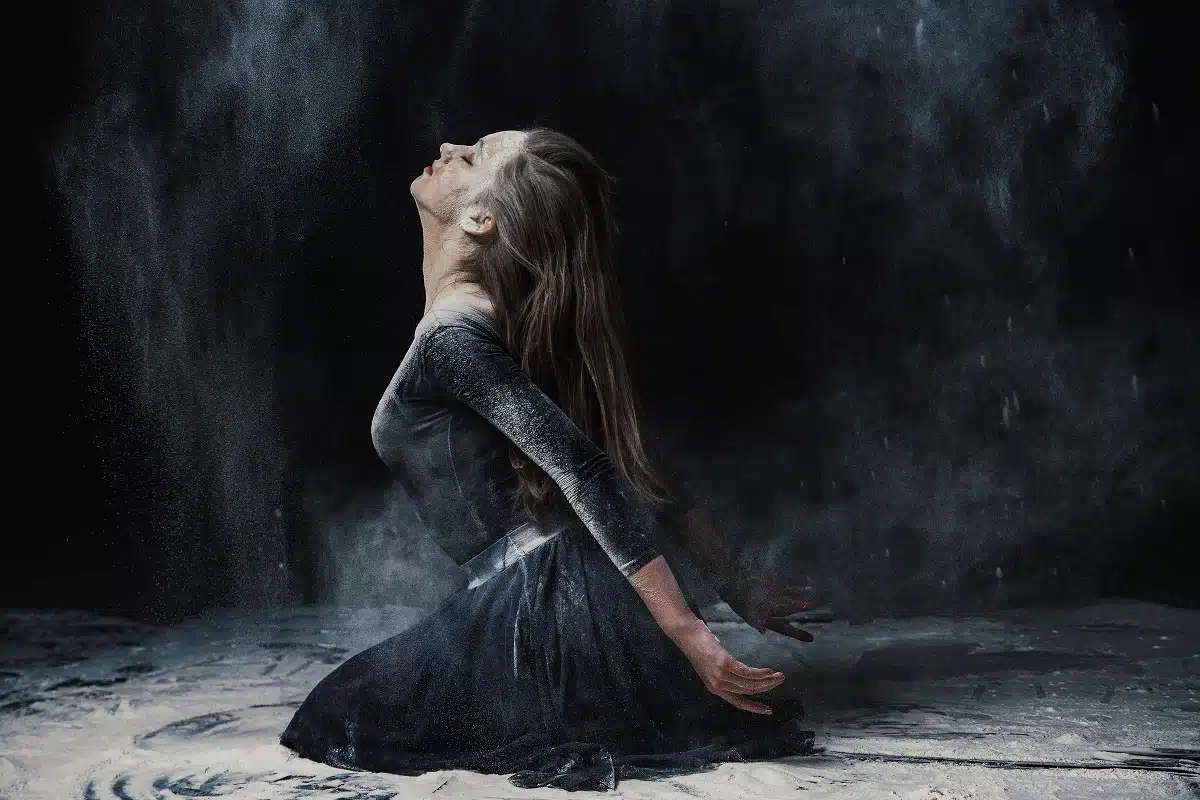
“Purgatory” by Arthur. M. Mann
Where the wild, witch elms wave, in the dim and
Of the moonbeams, half-encircled by the dark clouds over head,
Play the witches and the gnomes as they came forth from their homes,
And gibe, and laugh, and chatter with the lost souls of the dead.
Whose torture is the scream , that awakens from its dream
The happy sleep of childhood, or the deeper sleep of years,
With terror and affright, in the silence of the night,
And the horror of awaking, is the dim reflex of theirs.
There the murderer feels the stain; is it blood alone, or worse?
When remorse adds to the terror, that he knew throughout his life;
Where the wicked ones delight in the fearful hush of night,
In torturing the spirit with the curse that fell on Cain.
Where the wicked, now no more, lie in anguish by the shore
That is shown to them as heaven, but is ever out of reach,
For a curtain hangs between their spirits and the scene;
That is woven of their passions, and the knowledge lies with each,
And the witches gibe and leer at their victims, and the fiends
Surround the lost with torture, from the sun’s set, till its rise
With the horror of the spell that is ‘ gendered deep in hell;
And the torments of the damned, in the sight of Paradise.
“What the Soul Desires” by Augusta Theodosia Drane
There is a rapture that my soul desires,
There is a something that I cannot name;
I know not after what my soul aspires,
Nor guess from whence the restless longing came;
But ever from my childhood have I felt it,
In all things beautiful and all things gay,
And ever has its gentle, unseen presence
Fallen, like a shadow-cloud, across my way
It is the melody of all sweet music,
In all fair forms it is the hidden grace;
In all I love, a something that escapes me,
Flies my pursuit, and ever veils its face.
I see it in the woodland’s summer beauty,
I hear it in the breathing of the air;
I stretch my hands to feel for it, and grasp it,
But ah! too well I know, it is not there.
In sunset-hours, when all the earth is golden,
And rosy clouds are hastening to the west,
I catch a waving gleam, and then ’tis vanished,
And the old longing once more fills my breast.
It is not pain, although the fire consumes me,
Bound up with memories of my happiest years;
It steals into my deepest joys—O mystery!
It mingles, too, with all my saddest tears.
Once, only once, there rose the heavy curtain,
The clouds rolled back, and for too brief a space
I drank in joy as from a living fountain,
And seemed to gaze upon it, face to face:
But of that day and hour who shall venture
With lips untouched by seraph’s fire to tell?
I saw Thee, O my Life! I heard, I touched Thee,—
Then o’er my soul once more the darkness fell.
The darkness fell, and all the glory vanished;
I strove to call it back, but all in vain:
O rapture! to have seen it for a moment!
O anguish! that it never came again!
That lightning-flash of joy that seemed eternal,
Was it indeed but wandering fancy’s dream?
Ah, surely no! that day the heavens opened,
And on my soul there fell a golden gleam.
O Thou, my Life, give me what then Thou gavest!
No angel vision do I ask to see,
I seek no ecstasy of mystic rapture,
Naught, naught, my Lord, my Life, but only Thee!
That golden gleam hath purged my sight, revealing,
In the fair ray reflected from above,
Thyself, beyond all sight, beyond all feeling,
The hidden Beauty, and the hidden Love.
As the hart panteth for the water-brooks,
And seeks the shades whence cooling fountains burst;
Even so for Thee, O Lord, my spirit fainteth,
Thyself alone hath power to quench its thirst.
Give me what then Thou gavest, for I seek it
No longer in Thy creatures, as of old,
I strive no more to grasp the empty shadow,
The secret of my life is found and told!
From “The Purgatory of Poets” by Richard Sheldon Chadwick
I who have sung your joys, would sing your woes’
Woes which have wrung the hearts deep fountain dry,
Until the wells of nature have been froze,
And sorrows clouds have darken’d o’er the sky
They learn’d to live, and cared not soon to die
Death was the portal of meridian day :
The bridge which led to an immortal bower,
Of each ambrosial amaranthine flower,
Which springs in glory never to decay.
Arms! what of them ! ye proud victorious band,
Thrice were ye armed, immortal sons of God;
Who dropp’d the songs ofangels o’er the land,
And left a beacon , in each step ye trod,
And scattered roses on the fruitful sod;
Oh, ye were armed in every glorious song;
A legion prouder than e’er cross’d the plain,
To leave it steep’d in blood and cursed in pain ;
Armed against error, tyranny, and wrong,
Oh poesy, thou blessed power divine,
Thou spirit nymph which haunts the wood and dell;
Oh I have worshipped proudly at thy shrine;
And as a saint his God have loved thee well,
And generations yet unborn will tell;
How thou hast fann’d great freedom into flame ;
By Emmett’s grave, angelic form! she weeps ,
And watches o’er the cold turf where he sleeps
And with her tears embalms his glorious name.
A lingering look through the long arch oftime ;
I cast to mark the progress of my sires ;
Proud potent, peaceful, generous and sublime,
They march like royal monarchs with their lyres,
They kindle unextinguishable fires ,
Upon their country’s alter; and they fling,
Music on hearts which throb beneath the spell,
The thoughts bequeathed unto the land loved well,
Were pure as down from some archangel’s wing.
If purgatorial power can cleanse the mind,
And fit the soul for happiness and heaven,
Then are the poet’s blest, for of mankind
Whose hearts like theirs so deeply bave been riven,
To them indeed have crowns of thorns been given;
They wrought, they bled , they died, to win to light
Their gain- crushed brethren, fettered by the chains,
Which gnaw the bones and rust into the brains
And drive fell slavery into blackest night.
They gathered flowers amid the piercing thorns,
Ofcold neglect and calumny, and flung
Them forth upon their graves, like morn’s
Dawn blush of beauty-and like light they sprung
Out ofthe chaos, beautiful, and young,
Liberty’s firstlings on a desart world,
Perfuming dust by memory unforgot,
Whose monuments are in each living thought
Which keeps the flag of liberty unfurl’d.

From “The New Purgatory” by Elizabeth Rachel Chapman
Methought the Spirit of Love (whose patient wings
Still brood upon the homelessness of things,
And give the poet shelter while he sings),
Took visible shape, as it had been a man,
And stood erect before me, and began,
With piercing quietness, my soul to scan;
And finally, to speak. “Such spirits pine,”
It said, ” and droop, because of that divine
Decree which keepeth veilèd me and mine.
And hence it is permitted unto some
To visit now my unsuspected home,
Lest they should fail or e’er they thither come.
There see they beings utterly content,
By darkness undistressed, by doubt unrent,
To whom despondency is wonderment.
Their gladness lightens like a faultless gem,
And they whom earthly jars to tears condemn,
The brightness of its sheen appeaseth them.
I therefore come to offer thee my hand,
Which taking, thou may’st very quickly stand
With me in that serene and blessed land.”
I lifted up my eyes unto the face
Of him whose words had such exceeding grace,
And who had left so excellent a place,
And such delights for me had sacrificed—
If only momently. It had sufficed
A sweet- souled painter for a smitten Christ.
The living forehead with a radiance shone,
Such as, with us, transfigures death alone,
When pain is quieted , and grief is done.
The mouth was made as though it should have smiled,
But it was set in reprehension mild,
As mother’s mouth, constrained to blame a child.
And in the eyes-as though their power to bless,
To raise and to enrapture, had been less
Was housed the lips’ exilèd tenderness.
They looked as though it gave them pain to see,
So full they were, so charged they seemed to be
With thirsty, unaccepted clemency.
The whole was beauty, gentle as the glow
Of evening sunlight upon mountain snow,
When children sleep, and fathers homeward go;
And virile, as a youthful hero’s dream,
Beside a turgid, rock- impeded stream,
When rest and idlesse death and misery seem.
From “Ildegonda” by Tommaso Grossi
All in that age unlearned and crude
Loved terrors and excitement rude,
And knew the crafty friar well
To feed that taste the hidden spell:
And high was now that friar’s name
‘Mong those who sought the preacher’s fame.
Now while he used his talent rare
Trembled the listening nuns to hear;
Their hair stood upright on the head
To hear of purgatory dread,
Where suffering souls in penal flames
Ofheirs unthinking called the names,
Invoking those that careless live
From torturing pain relief to give.
Nor scrupled he with zeal well meant
Grim tales of horror to invent;
To tell of apparitions dread
Ghastly arising from the dead,
That came the future to foretell,
Door barred and bolted passing well
At dead of night ; of visions dire
In threatening aspect and attire,
Who visited a maiden fair,
Or hated rival resting there.
He told a tale of compact made
Between a loving youth and maid,
How rose the ghost at midnight drear,
How died the maid of mortal fear,
And close beside the grave was found
All lifeless, laid upon the ground.
The corpse was seen with hands untied
Unseemly lying on the side.
“Judge Not” by Adelaide Anne Procter
Judge not; the workings of his brain
And of his heart thou canst not see;
What looks to thy dim eyes a stain
In God’s pure light may only be
A scar-brought from some well- won field
Where thou wouldst only faint and yield.
The look, the air, that frets thy sight
May be a token that, below,
The soul has closed in deadly fight
With some infernal fiery foe
Whose glance would scorch thy smiling grace
And cast thee shuddering on thy face!
The fall thou darest to despise
May be the angel’s slackened hand
Has suffered it, that he may rise
And take a firmer, surer stand;
Or, trusting less to earthly things,
May henceforth learn to use his wings.
And judge none lost; but wait and see,
With hopeful pity, not disdain,
The depth of the abyss may be
The measure of the height of pain,
And love and glory that may raise
This soul to God in after days.
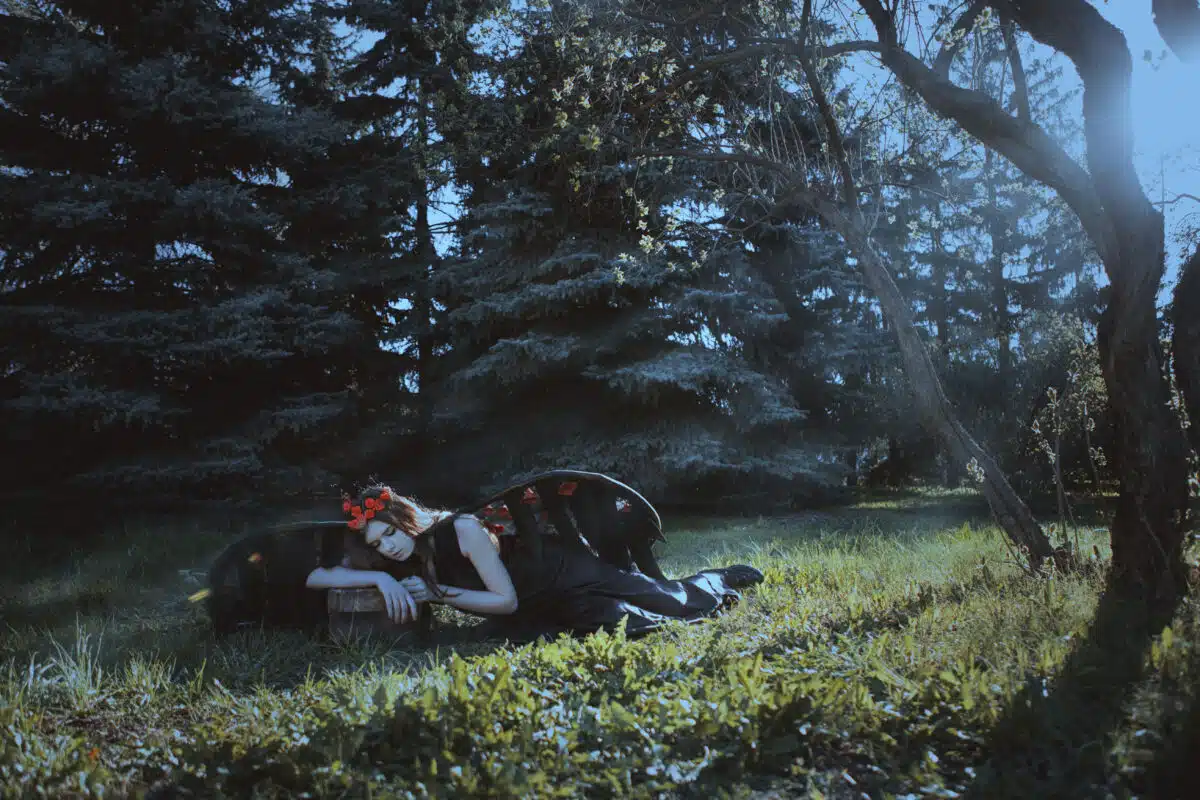
“Justice Only” by Edwin Arnold
Be not too proud of good deeds wrought!
When thou art come from prayer, speak truly!
Even if he wrongeth thee in aught,
Respect thy Guru. Give alms duly.
But let none wist! Live, day by day,
With little and with little swelling
Thy tale of duty done-the way
The wise ant-people build their dwelling;
Not harming any living thing;
That thou may’st have-at time of
dying- A Hand to hold thee, and to bring
Thy footsteps safe; and, so relying,
Pass to the farther world. For none
Save Justice leads there! Father,mother,
Will not be nigh; nor wife, nor son,
Nor friends, nor kin; nor any other
Save only Justice! All alone
Each entereth here, and each one leaveth
This life alone ; and every one
The fruit of all his deeds receiveth
Alone-alone; bad deeds and good!
That day when kinsmen, sadly turning,
Forsake thee, like the clay or wood,
A thing committed to the burning.
But Justice shall not quit thee then,
If thou hast served her, therefore never
Cease serving; that shall hold thee when
The darkness falls which falls forever,
Which hath no star, nor way and guide.
But Justice knows the road; and midnight
Is noon to her. Man at her side
Goes, through the gloom, safe to the hid light.
And he who loved her more than all,
Who purged by sorrow his offenses,
Shall shine, in realms celestial ,
With glory, quit of sins and senses.
“The Witnesses” by Henry Wadsworth Longfellow
In ocean’s wide domains,
Half buried in the sands,
Lie skeletons in chains,
With shackled feet and hands.
Beyond the fall of dews,
Deeper than plummet lies,
Float ships, with all their crews,
No more to sink or rise.
There the black slave-ship swims,
Freighted with human forms,
Whose fetter’d fleshless limbs
Are not the sport of storms.
These are the bones of slaves!
They gleam from the abyss;
They cry, from yawning waves,
“We are the witnesses!”
Within earth’s wide domains
Are markets for men’s lives;
Their necks are gall’d with chains,
Their wrists are cramp’d with gyves.
Dead bodies, that the kite
In deserts makes its prey;
Murders, that with affright
Scare schoolboys from their play!
All evil thoughts and deeds;
Anger, and lust, and pride;
The foulest, rankest weeds,
That choke life’s groaning tide!
These are the woes of slaves;
They glare from the abyss:
They cry, from unknown graves,
“We are the witnesses!”
“To the Past” by William Cullen Bryant
Thou unrelenting Past!
Strong are the barriers round thy dark domain,
And fetters, sure and fast,
Hold all that enter thy unbreathing reign.
Far in thy realm withdrawn
Old empires sit in sullenness and gloom,
And glorious ages gone
Lie deep within the shadow of thy womb.
Childhood, with all its mirth,
Youth, Manhood, Age, that draws us to the ground,
And last, Man’s Life on earth,
Glide to thy dim dominions, and are bound,
Thou hast my better years,
Thou hast my earlier friends-the good-the kind,
Yielded to thee with tears
The venerable form-the exalted mind.
My spirit yearns to bring
The lost ones back-yearns with desire intense,
And struggles hard to wring
Thy bolts apart, and pluck thy captives thence.
In vain- thy gates deny
All passages save to those who hence depart ;
Nor to the streaming eye
Thou giv❜st them back-nor to the broken heart.
In thy abysses hide
Beauty and excellence unknown- to thee
Earth’s wonder and her pride
Are gather’d, as the waters to the sea.
Labours of good to man,
Unpublish’d charity, unbroken faith,
Love, that midst grief began,
And grew with years, and falter’d not in death.
Full many a mighty name
Lurks in thy depths, unutter’d, unrevered ;
With thee are silent fame,
Forgotten arts, and wisdom disappear’d.
Thine for a space are they
Yet shalt thou yield thy treasures up at last ;
Thy gates shall yet give way,
Thy bolts shall fall, inexorable Past !
All that ofgood and fair
Has gone into thy womb from earliest time,
Shall then come forth, to wear
The glory and the beauty of its prime.
They have not perish’d-no !
Kind words, remember’d voices once so sweet,
Smiles, radiant long ago,
And features, the great soul’s apparent seat ;
All shall come back, each tie
Of pure affection shall be knit again;
Alone shall Evil die,
And Sorrow dwell a prisoner in thy reign.
And then shall I behold
Him, by whose kind paternal side I sprung,
And her, who, still and cold,
Fills the next grave-the beautiful and young.
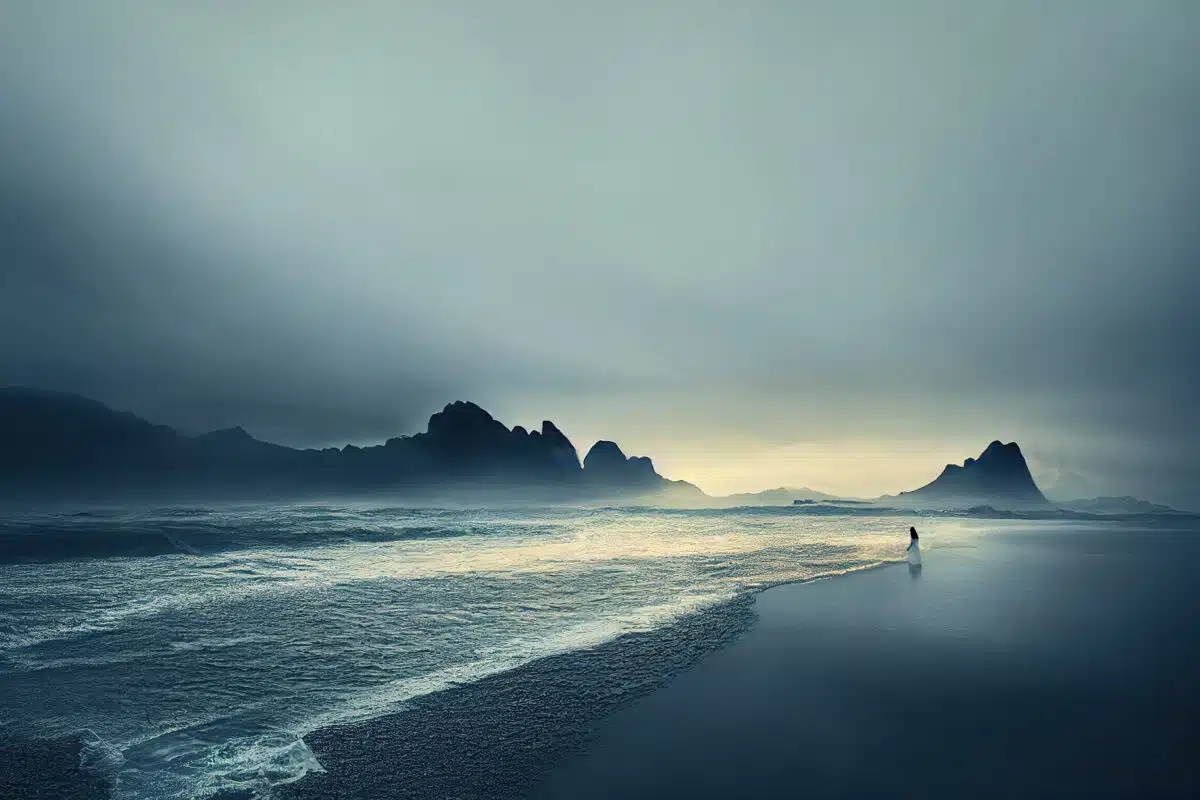
From “The Legend of St. Andrew” by the Aelfric Society
The inhabitants were
blithe of mood,
in spirit rejoicing.
Then was come forth
comfort after sorrow,
the ocean subsided
through the saint’s command,
the storm gave up its rage,
the sea-road stopped,
then clove the hill
a fearful cavern
and there let in
the flood to be embraced,
the yellow waves
the pouring commotion
the abyss swallowed up;
yet not the wave
The inhabitants were
blithe of mood,
in spirit rejoicing.
Then was come forth
comfort after sorrow,
the ocean subsided
through the saint’s command,
the storm gave up its rage,
the sea-road stopped,
then clove the hill
alone he plunged beneath,
but also of the host
the worst,
the eminent villains,
fourteen
departed with the wave
into destruction
under the abyss.
Then was terrified
and afraid many a spirit
among the people,
they thought and
the slaughter of the men
of severer conditions,
a gentler period,
since the stained with crime
the guilty of murder,
the war-players,
rested under the ground.
From “The Lament of Ceres” by Johann Christoph Friedrich von Schiller
Fruitless wish! Lamenting vain!
In its smooth track peacefully
Ever rolls day’s steady wain,
Ever fix’d is Jove’s decree.
He has turn’d his blissful head
From the gloomy realms away;
She to me is ever dead,
Now that she is Night’s sad prey, —
Till the waves, that darkly swell,
With Aurora’s colours glow;
Till across the depths of Hell
Iris draws her beauteous bow.
Is nought left me now to prove,
Nought that as a pledge may stand,
That the absent still may love?
Not a trace of that dear hand?
Can no loving bond, then, spread
O’er a mother and her child?
Of the living and the dead
Can there be no union mild?
No, she is not wholly flown!
We’re not wholly sever’d now!
For to speak one tongue alone
The eternal Gods allow.
When Spring’s children sink in death,
When the leaf and flower decay,
Smitten by the Northwind’s breath,
Sadly stands the naked spray:
Then I take what best can live
From Vertumnus’ teeming horn,
Off’ring it to Styx, to give
In return the golden corn, ―
Into earth, then, mournfully
Drop it on my daughter’s heart,
That it may a language be
Of my love, my bitter smart.
When the Hours’ unchanging dance
Brings with joy the Spring again,
Waken’d by the sun’s bright glance,
Will the dead fresh life obtain.
Germs that perish to the sight
In the chilly womb of earth,
In the colour- realm so bright
Free themselves again with mirth.
When the stalk shoots high in air,
Shyly lurks the root in night;
Equal in their fost’ring care
Are both Styx’ and Æther’s might.
Half they rule the living’s sphere,
Half the region of the dead;
Ah, to me they’re heralds dear,
Sweet tones from Cocytus dread!
Though herself be ever dumb
In the terrible abyss,
From the Spring’s young blossoms come
To mine ears these words of bliss, –
That, e’en far from daylight blest,
Where the sorrowing shadows go,
Lovingly may throb the breast,
Tenderly the heart may glow!
From “Fridolin” by Johann Christoph Friedrich von Schiller
And when he saw the furnace smoke,
And saw the workmen stand,
“Have ye, ye fellows,” thus he spoke,
Obey’d the Count’s command?”
Grinning they ope the orifice,
And point into the fell abyss:
“He’s car’d for-all is at an end!
The Count his servants will commend.”
The answer to his lord he brought,
Returning hastily,
Who, when his form his notice caught,
Could scarcely trust his eye :
” Unhappy one ! whence comest thou ?” —
“Back from the foundry”-” Strange I vow !
“ Hast in thy journey, then, delay’d ?” —
“Twas only, lord, till I had pray’d.
“For when I from thy presence went,
(Oh pardon me!) to-day,
As duty bid, my steps I bent
To her whom I obey.
She told me, lord, the mass to hear,
I gladly to her wish gave ear,
And told four rosaries at the shrine,
For her salvation and for thine.”

“Behind the Worlds” by L. Florence Wynne Ffoulkes
I AM One, in the innermost depths of the outermost
Nothing,
In the awful Abyss of the Sleep of the gods in
the dark;
I am one with the shame of the Elements, waiting
their clothing,
Till Mind shall have moulded them, formed them,
and lighted their spark.
I am One, in the loneliness, isolate, desolate, sterile,
All One—only knowing One Ultimate Concept
I AM;
I AM ONE, in the WORD, ‘neath a pall, in the centre
less exile,
Whom the gods know not whether in fulness to
Bless or to damn.
I am One ! I am buried away in the fathomless
places;
I am conscious, I live, and I THINK-I can trifle
with Death!
I am vague, I am void, I am lost, ‘mid the Measureless Spaces,
I AM I, in the embryo Life, of the Infinite Sheath!
I am One, in the Magic and Secret Arcanum of
BEING,
I am One, in the wide irresponsible Chaos of
Fate;
In the impulse that beareth me on, towards the impulse of seeing,
In the Whirl of the turbulent Forces of Love, and
of Hate!
I am One in the ALL; I am ALL in the ONE, and forever
I can pause with the gods in their rhythmical
Rotas of REST;
And I know there is nought in the Plenary Spaces
can sever
My part from the WHOLE, or my good from the
GOOD of the BEST!
I am One, in the Mind, and the Soul of the Life
that is endless,
In the ONE EVER WAS, EVER IS, AND THAT EVER
SHALL BE;
And I know, in the Essence of things, I can never be
friendless,
For I Live, and I Love, in the LIGHT of the Perfect Decree.
I am One, in the regions of waste that are trackless, and boundless,
I am One with the VOICE that shall UTTER the
aggregate CHORD ;
And I wait, in the Silence alone, in the Vault of the
Soundless,
With the ONE in the ALL that shall speak the
INEFFABLE WORD.
